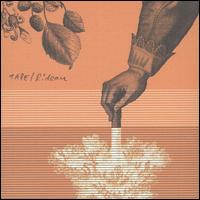Tape, "Rideau"
 Until now I’d have called Tape’s musicseasonally or temperamentally effective, but Rideau arrives as a near-reinvention of the trio’s sound, theirmost fully-realized and best record yet. Tapehas clearly taken a chance with this one and I’m glad.
Until now I’d have called Tape’s musicseasonally or temperamentally effective, but Rideau arrives as a near-reinvention of the trio’s sound, theirmost fully-realized and best record yet. Tapehas clearly taken a chance with this one and I’m glad.
I enjoyed Tape’s first two records as perfect manifestationsof a familiar aesthetic. Opera and Mileau worked in glitchist blurrings of chamber room noise: smallmachines, gauzy strings plucked, harmoniums and harpsichords swelled anddisassembled in a humble and über-patient way. These early works are ephemeral in the slow-swarming of theirconstruction, to the point where any poignancy or nostalgia grasped, seems torefract through an autumnal filter, as the aging discolorations and thick airof an attic might transform a life’s old memorials into one of the same sadsubstance. More than mood music, thesefirst two releases support tableaux of wintry decay that feel many times toototal, too sunken into their scene. I amreminded both of the music of Piano Magic and the self-deprecating title totheir retrospective: Seasonally Effective.
They’ve shifted glitch processing away from being the force that actedupon or moved each piece forward. Instead the computer plays itself and plays with beautiful restraint,briefly augmenting and blending with significantly pared-down, close tocrystalline melodic foregrounds, these played with the same ephemeral paletteof strings and bellows that, without the shimmering digital action, warpcyclically and stone solid.
Rideau is five tracks, each longer, morerepetitious and also simpler than the Tape that came before, though the moodsand access points within the work appear immediately more various andnumerous. The same instruments are bothmore distinct and codependent within a rigid structure, placing many sectionsinto what feels at first like a drum-less post-rock archetype, like the mostdetermined (not “studied”) moments of a late Gastr or early Tortoiserecord. Taken for the duration, though,waving with their stoic parts and dusted with microcosmic variations, thesetracks take on the consecrated air of high minimalism.
The last two songs, “Exuma” and “Long LostEngine,” project this mantra with two-note guitar and keyboard swells thatexpand and contract along motorized routes, windows back into the antique moodof the first two records, before, in their persistence, opening onto sparklingclear, monolithic vistas: holy shit. The pristine weightiness of this recordingalmost makes me hope for a remix version, something like Stephan Mathieu’sreworkings for On Tape, somethingthat would glimpse these proud forms in a kind of dissolution.



